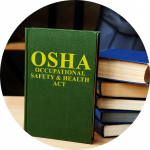 The Occupational Safety and Healthy Act (OSHA) was created by the United States Congress in 1970 to ensure the safe and healthy working conditions for workers by setting and enforcing standards, and by providing training, outreach, education and assistance.
The Occupational Safety and Healthy Act (OSHA) was created by the United States Congress in 1970 to ensure the safe and healthy working conditions for workers by setting and enforcing standards, and by providing training, outreach, education and assistance.
Safety compliance is important and adhering to all the OSHA regulations that apply to your business results in a workplace that is safe from serious hazards that can cause danger to employees. It is important to have a OSHA compliance plan in place and to review it often. Failure to comply with OSHA regulations can lead to investigations when hazards are reported. This can ultimately result in financial penalties and a reputation risk for the business.
OSHA compliance is mandatory. Businesses must be in compliance with federal OSHA regulations or the state-run program, which must be at least as effective as the federal program. OSHA covers most private sector employers and employees in all 50 US States, the District of Columbia and other U.S. jurisdictions either directly through Federal OSHA or through an OSHA-approved state plan.
Compliance with OSHA regulations along with implementing your own well-designed safety program is essential. Accidents and injuries occurring on the job can result in major medical and legal expenses to the business.
OSHA inspections are done without advance notice and are based on a published, standard procedure. The inspections generally begin with a presentation of credentials from the inspector and a conference with the employer. There is a walkaround conducted with a representative of the employer as well as an authorized representative of employees, if requested. The most frequently cited OSHA standard violations in 2020 were:
- Fall Protection
- Hazard Communication
- Respiratory Protection
- Scaffolding
- Ladders
- Control of Hazardous Energy
At Southland Data Processing, we make access to OSHA materials and current standards easy. Our OSHA Store gives businesses the resources needed to maintain proper compliance. Plus, our HR On Demand service provides help from an experienced HR professional who is available to assist with questions and concerns. Learn more today.
*Southland Data Processing, Inc. (“SDP”) is not a law firm. This article is intended for informational purposes only and should not be relied upon in reaching a conclusion in a particular area of law. Applicability of the legal principles discussed may differ substantially in individual situations. Receipt of this or any other SDP materials does not create an attorney-client relationship. SDP is not responsible for any inadvertent errors that may occur in the publishing process.
